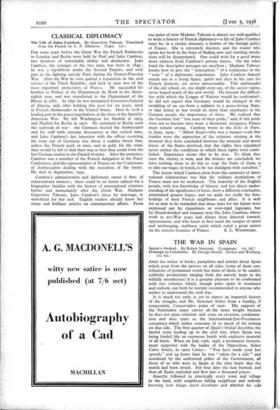CLASSICAL DIPLOMACY
The Life of Jules Cambon. By Genevieve Tabouis. Translated from the French by C. F. Atkinson. (Cape. i5s.)
FOR some years before the Great War the French Embassies in London and Berlin were held by Paul and Jules Cambon, two brothers of remarkable ability and distinction. Jules Cambon, the younger of the two men, was born- in 1845 he was a republican under the Second Empire, and took part in the fighting outside Paris during the Franc-o-Prussian War. After the War he soon gained a reputation in the civil service of the Third Republic, and held in turn two of the most important prefectures of France. He succeeded his brother as Prefect of the Department du Nord in hii thirty- eighth year, and was transferred to the Department of the Rhone in 1887. In 1891 he was nominated Governor-General of Algeria, and, after holding this post for six years, went as French Ambassador to the United States. Here he took a leading part in the peace negotiations at the close of the Spanish- American War. He left Washington for Madrid in 1903, and Madrid for. Berlin in 1907. He remained at Berlin until the outbreak of war : the Germans treated the Ambassador and his staff with extreme discourtesy at this critical time, and Jules Cainbon's last interview with the officer escorting his train out of Germany was about a sudden threat that, unless the French paid, at once, and in gold, for the train, they would be left to find their way as best they- could from the last German station to the Danish frontier. After the armistice, Cambon was a member of the French delegation at the Peace Conference, and the representative of France on the Conference of Ambassadors dealing with the execution of the treaty. He died in September, 1935.
Cambon's administrative and diplomatic career is thus of extraordinary interest ; there could be no better subject for a biographer familiar with the history of international relations before and immediately after the Great War. Madame Genevieve Tabouis, Jules Cambon's niece by marriage, is well-fitted for her task. English readers already know her sharp and brilliant articles on contemporary affairs. From
one point of view Madame Tabouis is almost too well-qualified to write a history of French diplomacy—a life of Jules Cambon must be, in a certain measure, a history of the foreign policy of France. She is extremely discreet, and the reader who opens her book in the hope of. finding new and startling revela- tions will be disappointed. One could wish for a good many more extracts from Cambon's private letters. On the other hand the descriptive passages are excellent ; Madame Tabouis knows how to give the " atmosphere " of a conference or the " tone " of a diplomatic negotiation. Jules Cambon himself stands out as a living figure, quick and alert in his care for French interests, yet never unreasonable. This ambassador of the old school, or, one might even say, of the ancien regime, never hoped much of the new world. He foresaw the difficul- ties with which the League of Nations would be confronted ; he did not expect that Germany would be changed in the twinkling of an eye from a military to a peace-loving State, or that defeat in war would do more than emphasise to the German people the importance of force. He realised that the Germans had " lost none of their pride," and, if this pride were not to become once more a dictatorial arrogance, France must remain strong. Cambon wrote in the Echo de Paris, in June, 1919: "Albert Sorel—who was a master—said that treaties were the expreision of the relations existing at the moment they were concluded between the material and moral forces of the States involved, that the rights they stipulated never outlast the conditions in which these rights were estab- lished. Experience shows this to- be true. To think that once the victory is won, and the treaties are concluded, we have nothing more to do but to reap the fruits of them, is to take our wages in words, to be too indulgent with ourselves."
The lesson which Cambon drew from this summary of inter- national relationships was 'that the military institutions of France must not be weakened. The majority of the English people, with less knowledge of history, and less direct under- - standing of the significance of force, drew a different conclusion, entertained greater hopes, and set aside too easily the fore- bodings of their French neighbours and allies. It is well for us now to be reminded that these fears for the future were expressed not by chauvinists or over-rigid logicians, but by liberal-minded and humane men like Jules Cambon, whose work in pre-War years had always been directed towards appeasement, and who knew at first hand the temper of mind and unchanging, stubborn spirit which ruled a great nation on the eastern frontiers of France. E. L. WOODWARD.


















































 Previous page
Previous page